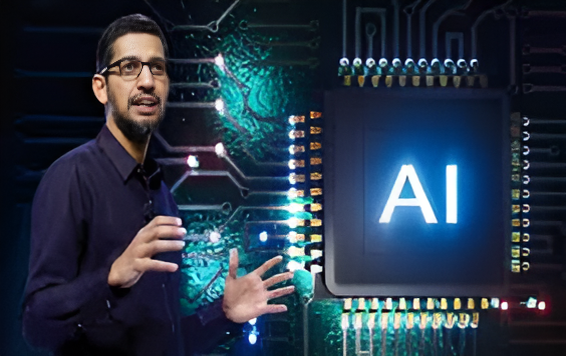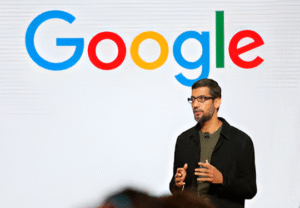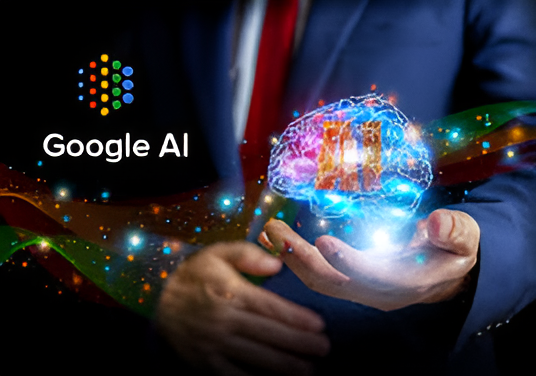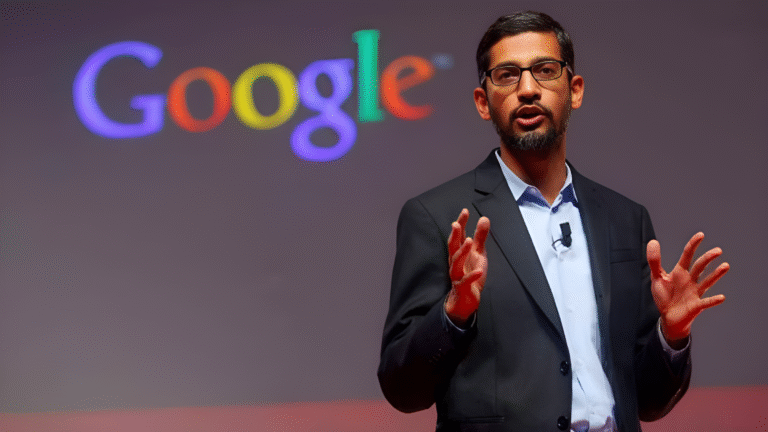
With the swift development of artificial intelligence (AI), anxiety about widespread job loss is mounting in various sectors. Recently, there have been rampant rumors that Google might replace as many as 180,000 jobs with AI tools. After a period of intense speculation and worry, Google CEO Sundar Pichai has finally responded to these worries directly, providing essential clarification regarding the company’s position on AI and its effects on human employment.

Sundar Pichai Finally Speaks Out on AI Job Loss Concerns: The Truth Behind the 180,000 Job Rumors
As we enter a time when AI is transforming all industries, numerous workers are anxious that automation could soon make them outdated. It was reported recently that Google could cut 180,000 jobs as a result of AI integration. The news ignited panic, discussions, and profound uncertainty. To clear the air, Sundar Pichai made a public statement to explain Google’s perspective on AI’s role in the workforce and what the future holds.
The Origin of the 180,000 Jobs Rumor
The speculation regarding Google possibly dismissing 180,000 workers because of AI developments started following the leak of an internal document that suggested AI-related restructuring within Alphabet, the parent company of Google. The figure appeared to be speculative, but it spread quickly and caused many to think that a mass layoff was on the way.
The speculation was amplified by various news outlets and social media influencers, which further fueled fears among the vast global workforce of Google. With 180,000 being over 80% of Google’s total workforce, the figure is not only astonishing but also difficult to accept.
Pichai’s Response: A Much-Awaited Clarification
Known for his composed demeanor and considerate leadership, Sundar Pichai selected a media interview to respond to these concerning allegations. Here’s a detailed account of his statement:
„AI serves to augment human productivity rather than to completely replace humans. Pichai stated, “At Google, we aim to develop AI that enhances how people work and helps them achieve more, rather than eliminating their roles.”
He reiterated that although some roles might change or adapt, Google does not intend to replace human workers entirely with AI technologies. He described the claim regarding the loss of 180,000 jobs as “inaccurate and misleading.”
Google’s Current AI Integration Strategy
Sundar Pichai emphasized that rather than replacing workers, Google is focusing on actively investing in AI upskilling for its employees. The company has already rolled out internal training programs designed to provide its workforce with AI-related knowledge. Among these are:
- AI-first engineering certifications
- Cloud AI development courses
- Prompt engineering bootcamps
- AI ethics and safety modules
Pichai is of the opinion that the future workforce should work together with AI rather than compete with it.
The Bigger Picture: AI’s Dual Role
There is no denying that AI brings with it both prospects and difficulties. Industry experts suggest that while some repetitive, rule-based jobs might vanish, new positions will arise as well. These can consist of:
- AI Prompt Specialists
- Model Trainers
- Ethical AI Auditors
- Data Annotators
- AI System Designers
It seems that Google is coming into alignment with this wider comprehension by retraining its personnel to occupy these new roles enhanced by AI.
What the 180,000 Figure Really Means
Despite Sundar Pichai’s firm dismissal of the claim regarding 180,000 layoffs, some restructuring at Google has taken place in 2023 and early 2024. Departments such as:
- Google Assistant
- Ads & Marketing
- Core Engineering
- YouTube
…have experienced layoffs of small to medium scale, primarily because of overlapping roles rather than AI alone. Internal sources indicate that these decisions were strategic and not solely focused on AI. The figure of 180,000 may be inflated, arising from misinterpretations of internal planning documents or speculation fueled by fear.
Employee Reactions: Relief with Caution
In the wake of Pichai’s statement, a number of Google employees voiced their relief; however, the overall sentiment is still mixed. Certain individuals hold the belief that, although no direct danger currently exists, the company is moving toward a future with greater reliance on AI.
A staff member who wished to remain unnamed remarked:
„Wir schätzen die Offenheit von Pichai, aber wir dürfen die Geschwindigkeit, mit der sich KI entwickelt, nicht außer Acht lassen. Change is unavoidable; we only hope to be part of that transformation rather than excluded from it.
Industry-Wide Trend: Is Google Alone?
Google is not the only technology firm undergoing such examination. In the last year, companies like Microsoft, Meta, Amazon, and even IBM have garnered attention due to layoffs connected to AI and automation. A transformation is occurring throughout the tech ecosystem, in which companies are reconciling human expertise with machine intelligence.
Pichai states that Google’s distinguishing factor is its dedication to developing AI responsibly—making sure that AI serves people rather than harming them.
The Future Outlook: Coexistence, Not Replacement
Under Sundar Pichai’s leadership, a hybrid work model is being fostered, with AI serving as a formidable partner that enhances employees’ performance and efficiency. He stays hopeful that:
- AI will eliminate routine tasks, enabling staff to direct their attention toward strategic and creative endeavors.
- New job opportunities that we have yet to conceive will be opened up by AI.
- Workers who demonstrate flexibility and adaptability will excel in the age of AI.
This indicates a more balanced perspective—rather than complete automation or widespread job loss, the future may entail large-scale collaboration between humans and AI.
Expert Opinions: A Mixed Bag
Optimists Say:
- AI is a groundbreaking instrument for enhancing productivity and driving economic development.
- It is a good thing that Pichai has implemented an ethics-first approach at Google.
- In the long term, most job losses will be prevented through reskilling.
Skeptics Warn:
- Not every employee will be able to reskill quickly enough.
- Positions of mid-level management and administration are the most at risk.
- AI systems might develop greater autonomy over time, leading to a decrease in human oversight roles.
Nonetheless, there is consensus among most that firms should place a priority on transparency, training, and employee involvement in the process of AI adoption.
Conclusion
Sundar Pichai’s remarks have offered essential reassurance amid uncertainty. Although AI is certainly transforming the workforce, it is not completely replacing it—at least not at Google. It seems the rumor about a loss of 180,000 jobs is highly inflated, and Google’s current path is more about evolution than elimination.
As our world becomes more and more influenced by AI, leaders such as Pichai highlight that technology serves as a tool; the real challenge is in our wise utilization of it. The main point to remember? Get ready, adjust, and develop—AI is a permanent fixture now, just like we are.
For more Information : Health tips , Entertainment, food Technology





